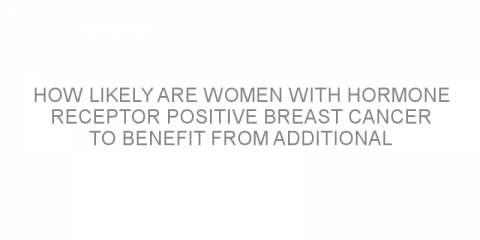In a nutshell This study examined the effect that restarting hormone treatment, as compared to stopping it, had on progression-free survival. It found that restarting treatment led to increased progression-free survival. Some background Breast cancer is classified into different subtypes depending on the prescence or absence of certain...
Read MoreHormone receptor status-Positive (ER and/or PR) Posts on Medivizor
Fulvestrant: an option for estrogen-receptor positive breast cancer that has spread
In a nutshell This study aimed to compare fulvestrant (Faslodex) to other standard endocrine agents in patients with advanced hormone sensitive breast cancer. This study concluded that fulvestrant was as effective as the available standard endocrine agents. Some background Advanced hormone sensitive breast cancer (BC) is cancer that has...
Read MoreComparing the effects of combined PI3K inhibitor/endocrine therapy versus endocrine therapy alone in ER-positive breast cancer
In a nutshell This study investigated whether the addition of the PI3K inhibitor pictilisib (Stemolecule GDC-0941) can increase the anti-tumor effects of anastrozole (Arimidex) in patients with estrogen receptor-positive (ER-positive) primary breast cancer (BC). Combined treatment with pictilisib (PIC)...
Read MoreExtended adjuvant therapy in hormone-receptor-positive early breast cancer
In a nutshell This review examined the benefits of extending hormone therapy from 5 to 10 years in patients with hormone receptor positive breast cancer. The study concluded that treatment recommendations should take factors such as previous treatments and potential side effects into account. Some background Hormone-receptor (HR)-positive breast...
Read MoreHow likely are women with hormone receptor positive breast cancer to benefit from additional exemestane or tamoxifen?
In a nutshell This study looked at the benefit of additional hormone therapy in premenopausal women with hormone receptor-positive HER2 negative (HR+ HER2-) early breast cancer. They found that patients at higher risk of cancer returning showed greatest benefit from exemestane (Aromasin) plus ovarian function suppression (OFS). Some background HR+...
Read MoreAdding bevacizumab to letrozole treatment in hormone receptor-positive metastatic breast cancer – A good idea?
In a nutshell This study looked at the effect of adding bevacizumab (Avastin) to letrozole (Femara) treatment in patients with hormone receptor-positive (HR+) metastatic (spread to other areas) breast cancer. They found that bevacizumab treatment prolonged the amount of time before patients experienced worsening of their...
Read MoreEverolimus plus exemestane – an effective combination therapy or not?
In a nutshell This study examined the addition of everolimus (Afinitor) to exemestane (Aromasin) for the treatment of patients with hormone-receptor-positive (HR+) and HER2- breast cancer. The study concluded that adding everolimus (EVE) to exemestane (EXE) did not significantly improve overall survival. Some background EXE is a treatment...
Read MoreCan treatment with palbociclib affect a person’s quality of life?
In a nutshell This study examined the effect of the drug combination, palbociclib (Ibrance) plus fulvestrant (Faslodex) on the quality of life of breast cancer patients. The study concluded that palbociclib plus fulvestrant allowed patients to maintain a good quality of life while experiencing delayed disease progression. Some background...
Read MoreCan denosumab help improve bone health in women taking aromatase inhibitors?
In a nutshell This study investigated the effects of the drug denosumab (Prolia) in postmenopausal patients with hormone-receptor positive breast cancer treated with aromatase inhibitors. The study concluded that denosumab reduces the risk of bone fracture in these patients. Some background Aromatase inhibitors are hormonal therapies....
Read MoreA new treatment option for progressive hormone receptor-positive breast cancer
In a nutshell This study examined the effectiveness of palbociclib (Ibrance) in the treatment of hormone receptor-positive breast cancer patients. The authors found that palbociclib treatment increased progression free survival. Some background Major treatment options for hormone receptor-positive (HR+, dependent on the hormones estrogen and/or...
Read MoreTesting the effectiveness breast cancer tumor removal by freezing
In a nutshell This Phase 2/3 trial in California and Texas aims to test the effectiveness of cyroablation for the treatment of breast cancer. The main outcome measures will include biopsy (sample of tissue is removed to test for prescence of cancer) and magnetic resonance imaging (MRI, scan that uses magnetic fields to image body tissues). The details...
Read MoreCould acupuncture help with the symptoms related to hormone therapy in breast cancer?
In a nutshell The authors aimed to determine if acupuncture could reduce medication-induced hot flashes in patients with breast cancer. Some background Aromatase inhibitors are a form of hormone therapy used for women with hormone-receptor positive breast cancer (dependent on the hormones estrogen or progesterone for growth). Hot flashes are an...
Read More












